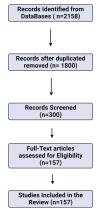Digital Device Usage and Childhood Cognitive Development: Exploring Effects on Cognitive Abilities
- PMID: 39594874
- PMCID: PMC11592547
- DOI: 10.3390/children11111299
Digital Device Usage and Childhood Cognitive Development: Exploring Effects on Cognitive Abilities
Abstract
The increasing ubiquity of digital devices in childhood had outpaced the understanding of their effects on cognitive development, creating a significant research gap regarding their long-term impact.
Objective: The present narrative overview explored the complex relationship between digital device usage and cognitive development in childhood.
Methods: We conducted a comprehensive literature search across multiple databases, including PubMed, Embase, Scopus, and Web of Science, to critically assess cognitive domains such as attention, memory, executive functions, problem-solving skills, and social cognition. Incorporating over 157 peer-reviewed studies published between 2001 and 2024, we used strict inclusion and exclusion criteria to ensure scientific rigor.
Results: The review integrated empirical findings with established theoretical frameworks, particularly from cognitive development and media psychology, to highlight both the advantages and risks of early, frequent exposure to technology. The potential for digital devices to enhance cognitive skills, such as multitasking and information processing, was weighed against risks such as cognitive overload, diminished attention spans, and impaired social skills. We also examined psychological and behavioral outcomes, including identity formation, emotional regulation, and maladaptive behaviors associated with excessive screen time. Additionally, we identified strategies to mitigate negative effects, emphasizing structured digital engagement and parental involvement to support healthy cognitive and psychological growth. Our findings provided actionable recommendations for parents, educators, and policymakers, promoting optimal digital practices that enhanced cognitive development while safeguarding against potential harms.
Conclusions: The review offered essential insights for stakeholders in child development, education, and policy-making, highlighting the need for balanced integration of digital tools in childhood learning environments.
Keywords: attention; childhood cognitive development; digital device usage; educational technology; executive functions; memory; psychological resilience.
Conflict of interest statement
The authors declare no conflicts of interest.
Figures
References
-
- Subrahmanyam K., Šmahel D., editors. Digital Youth: The Role of Media in Development. Springer; New York, NY, USA: 2011. Connecting Online Behavior to Adolescent Development: A Theoretical Framework; pp. 27–39.
-
- Valkenburg P.M., Piotrowski J.T. Plugged in: How Media Attract and Affect Youth. Yale University Press; New Haven, CT, USA: 2017.
Publication types
LinkOut - more resources
Full Text Sources
Miscellaneous




